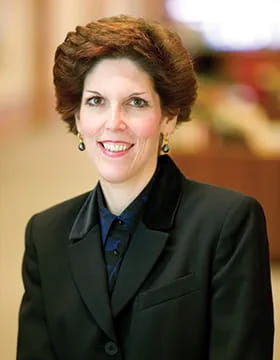- Share
Reflections from Loretta J. Mester
In a new series of regular reflections, I plan to discuss analysis from our Reserve Bank and also some of the steps we are taking to ensure that our own workplace is diverse and inclusive and one that offers opportunities to all of our employees.
The views expressed here are my own and not necessarily those of the Federal Reserve System or my colleagues on the Federal Open Market Committee.
Last week, like other people, I was appalled by the violent attacks in the Atlanta area in which eight people, including six women of Asian descent, were viciously slain. These killings come in the wake of a sharp increase in attacks against Asians since the start of the pandemic and amid the rise in hate speech and discriminatory actions targeted at people because of their race, ethnicity, or gender.
I struggled with whether or not I should send out a message after the Atlanta attack. On the one hand, I believe such a heinous act requires condemnation and a public statement that I, and the institution I lead, are committed to championing diversity, equity, inclusion, and economic opportunity. It would be wrong to just look away. On the other hand, reacting only by going on record as being against atrocious acts like this feels too much like resigned acceptance that this is the way things are. Social responsibility requires us to act. The hard question is what can be done to reduce the expression of hate and violence; to end racism, sexism, and xenophobia; and to foster a more equitable society.
In looking for solutions, we should remember that the majority of people do not hate one another. The majority of people, whatever their background, share the same goals. We want to live a good life, earn a decent living, provide for our children, pursue leisure activities, help our communities, and contribute to society. Some people have come to believe that when people in another group achieve these goals, it has to mean that their own group has lost, raising anger and resentment. But life is not a zero-sum game; it is not a ballgame in which one team wins and the other loses. Instead, by working together on common goals, we can all win. For example, if we invest enough so that everyone has the opportunity to obtain a first-rate education, we all end up better off.
Limiting opportunity because of race, ethnicity, or gender threatens the health of our economy. Here at the Federal Reserve Bank of Cleveland we will be asking ourselves how our policy decisions, whether in the realm of monetary policy, regulatory policy, or payments policy, can promote inclusive growth. We recognize that this is our responsibility – it is not someone else’s problem. At the same time, we know that we have a lot to learn and that we cannot do this alone: we need to work with our community partners, with people of color, and with others who are striving to achieve a more equitable and, thereby, a stronger economy. I am looking forward to working with our new Equity and Inclusion Advisory Council to advance our knowledge and effectiveness.
As part of our focus on racial equity and our Program on Economic Inclusion, the Cleveland Fed is continuing to conduct research and to provide data that shine a bright light on economic disparities. We are examining the causes of these disparities and their implications. But we are also focusing on solutions. Our goal is an economy in which race, ethnicity, or gender does not determine one’s economic outcomes and one in which economic opportunity is available to all people.
The Cleveland Fed is going to be part of the conversation on these complex issues. In a new series of regular reflections, I plan to discuss analysis from our Reserve Bank and also some of the steps we are taking to ensure that our own workplace is diverse and inclusive and one that offers opportunities to all of our employees. My next three messages will focus on sectors that are critical to economic well-being but that exhibit significant levels of disparity: education, employment, and housing. I hope you will engage with me to keep this conversation going so that together we can find solutions to reduce racism, sexism, and xenophobia. Economic opportunity and inclusion are important factors in achieving a strong economy, in keeping with the mission of the Federal Reserve. We will not be distracted in our pursuit because the goal is too important: an economy that lives up to its full potential for all Americans.


